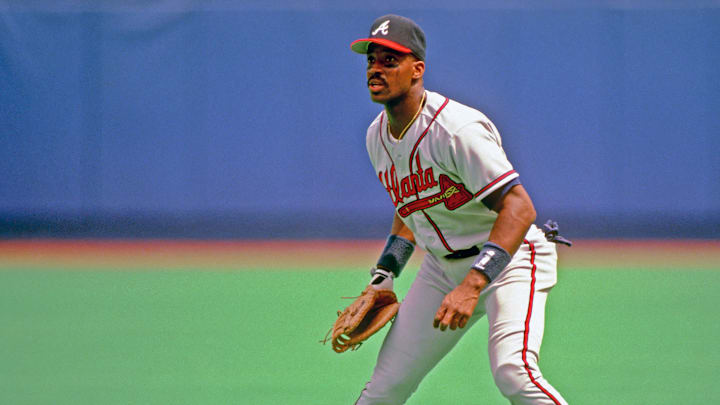2021 group (Joc Pederson, Eddie Rosario, Jorge Soler, Adam Duvall)
It’s very hard not to mention these four when talking about impactful deadline deals, especially given the end result of the season; and the humble beginnings, of course.
Entering the 2021 trade deadline, the Atlanta Braves were faced with more questions than answers about their lineup. Following one of the most heartbreaking sites on July 10th, which saw superstar phenom Ronald Acuna Jr go down hard with a season-ending knee injury.
A flurry of emotions rocked the clubhouse, front office, and deep-rooted fan community which all led to the same central point: a move needed to be made, and quickly, or any hopes of a deep postseason run would be all but crushed.
Something had to give; and eventually it did.
Between July 15th through the end of the deadline, Alex Anthopoulos went out and acquired Joc Pederson from Chicago, Jorge Soler from Kansas City, Adam Duvall from Miami, and Eddie Rosario from Cleveland.
At first glance, these moves seemed more like a hail mary; almost as if AA was scrambling to try and replace Acuna in right.
There’s just one problem, though: you can’t simply replace a player like Acuna, and the notion of adding four names who weren’t amounting to anything of relative significance that season wasn’t one of glaring positivity.
Of course, we all know what happened after that.
Atlanta went from a struggling club barely circling .500 to a surprising powerhouse that captured the turning heads of fans all over the game. They ended the year with an 88-73 record, nabbing their fourth consecutive division title before arriving on the doorstep of the Postseason.
The notion of replacing Acuna was a hard one to swallow for many Braves fans, and anyone involved would likely tell you a similar story: you can’t REALLY replace a player like Acuna.
However, you CAN go out and get proven postseason performers having relatively underwhelming seasons and add them to a team that desperately needed life, wind them up, and watch them go; and go they did.
Joc Pederson won the hearts of Braves fans everywhere with his big bat, bigger personality, and even bigger pearls. Then you have Jorge Soler who blasted a ball into orbit which became the deciding factor of the 2021 World Series, effectively winning him the honors of World Series MVP.
JORGE SOLER SENDS IT 🚀
— SportsCenter (@SportsCenter) November 3, 2021
Braves go up 3-0 in Game 6 of the #WorldSeries
(via @MLB)pic.twitter.com/dYliyTmX17
Adam Duvall slugged 16 HR and 45 RBI with a .800 OPS in the final 55 games of the season, delivering one of the most memorable home runs of the playoffs, and Eddie Rosario showed everyone why Anthopoulos went out and got a struggling, injured platoon player. Providing proof of his postseason ability in the form of a .383/.617/1.073 slash line with 3 HR, 11 RBI, and several game-saving defensive plays.
The Braves could not have asked for a better start to a big series versus the Dodgers.
— Justin Toscano (@JustinCToscano) May 23, 2023
Eddie Rosario -- the NLCS hero against the Dodgers in 2021 -- launched a three-run shot.
4-0, Braves pic.twitter.com/AxY3gB8rnF
What makes this story incredible beyond comparison is the humble beginnings. On July 10th, the Braves were all but written off following the loss of their superstar outfielder, and not three and a half months later, they were atop the baseball mountain. The 2021 Braves are living proof that no season is ever truly ruined due to an impactful injury, especially when you’ve got a general manager who carries himself the way Anthopoulos does.
